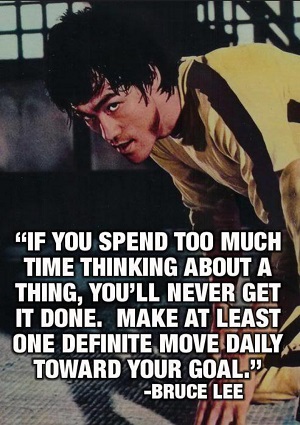There might be affiliate links on this page, which means we get a small commission of anything you buy. As an Amazon Associate we earn from qualifying purchases. Please do your own research before making any online purchase.
What is better when setting goals, approach or avoidance? Is it better to focus on avoiding things you hate and want to avoid or focus on the positive things you want from life?
This post takes a deep look at approach vs avoidance to find out if it is more motivating to set goals that help you change those things you hate or focus on your dreams, desires and positive outcomes from life.
Let's get to it!
Approach vs Avoidance: Which style of Goal Setting is Better?
Working hard in order to avoid looking like a fool is more motivating than working hard in order to do well. It is just human nature.
That's why, no surprise, many goals are formulated as a means to avoid things you don't want to do.
I want to… lose weight to avoid being made fun of. I want to… make more money to avoid being in debt. I want to… stop procrastinating to avoid missing deadlines.
Avoidance goals work – the prospect of loss is more motivating than the prospect of gain. But they're also stressful and sometimes less effective than goals formulated as a means to approach.
| Approach | or | Avoidance | ? |
|---|---|---|---|
| “I will try to get a good grade” | or | “I will try to avoid getting a bad grade” | ? |
| “I will try to look good” | or | “I will try to avoid looking fat” | ? |
| “I will try to get a good performance review” | or | “I will try to avoid getting negative feedback” | ? |
Each goal type is a simple reflection of the other.
One focuses on the positive, the other on the negative.
There's nothing wrong with an occasional focus on the negative if it actually helps you achieve something positive.
For most of high school, it was avoidance that drove me to work hard – I didn't want to disappoint my parents. So I studied, a lot. Much more than I would have if I had tried focusing on the positive.
So, which should you use – approach or avoidance? Here are two guidelines to help you decide which type of goal-setting is better: approach or avoidance.
Approach Goals Are Pleasurable; Avoidance Goals Are Stressful
With three hours left to go before the deadline, you can bet I'm motivated.
But motivated isn't the same thing as excited. Someone being bullied can be highly motivated to learn how to fight. But I'm willing to bet that they also feel miserable. They're anxious to learn as much as possible. Anxiety is motivating, but it's also unpleasant.
“I want to lose weight in order to look sexy.” If you have an approach goal and think about it, it will leave you excited and feeling good.
“I want to lose weight in order to stop looking fat and ugly.” If you have an avoidance goal and think about it, it will leave you anxious and feeling bad.
Sometimes anxiety is worth the cost. After all, I feel happy after completing my goals, whether they were motivated by excitement or anxiety. But most people are over-stressed. Adding even more stress may not be worth it.
Avoidance Goals Are A Double-Edged Sword
Anxiety isn't just motivating – it's also risky. Sometimes, avoidance goals are too emotionally charged – producing so much negative emotion that rather than shocking you into action, they shock you comatose.
Psychologists almost universally recommend approach over avoidance goals. That's the reason.
In one series of studies, those who were encouraged to write an avoidance goal were significantly more likely to procrastinate than those encouraged to write an approach goal.1 In another series of studies, those who were encouraged to write an avoidance goal performed worse – getting lower grades, completing fewer tasks, and running shorter distances.5
However, keep in mind that those in the avoidance group did worse, but only as an average. Most did worse, but some did better. If you're able to handle stress and don't flinch away from anxiety, avoidance goals will work for you.
The workplace is full of avoidance goals, “I will avoid upsetting my boss”. “I will avoid getting noticed”. “I will avoid being late”. “I will avoid missing the deadline”.
These types of goals are stressful. For many people, those goals could become more effective and less stressful by being rewritten as approach goals, “I will please my boss”. “I will stand out and shine”. “I will be on time”. “I will finish ahead of the deadline.”
Avoidance Goals Help Smokers Quit
In one long-term study of smokers wanting to quit cold-turkey, those in the avoidance group were able to keep away longer than those in the approach group.3 One study does not make science, but it's suggestive that in some areas of life, fear of death and disease can be useful.
On the other hand, not all of those in the avoidance group did better. For some, the fear was so overwhelming that it created anxiety. Guess how they relieved that anxiety? By smoking.
Approach or Avoidance?
So, which goal type do you think better suits your goal?
Approach – focusing on the positive, or avoidance – focusing on the negative?
Rewrite your subgoal in terms of the goal type you think is a better fit!
Want to learn more about goals? Check out some of the science behind goal-setting theory. Want to be happier? Check out my massive post on 54 Ways to Be Happy.
Also, if you want to incorporate habits that bring long-lasting happiness, check out Happier Human that contains 53 science-backed habits for a happier and more successful you.
Let me know your thoughts in the comments below. Which is better? Approach or avoidance?
Images Featuring the Concept of Approach Vs. Avoidance


- Latham 1974 – 1-day goal-setting workshop given to 20 tree loggers increased productivity over the following 3 months, valued at a quarter-million dollars.
- Cambell 1976 – Chess players given a hard goal were more likely to successfully complete higher-level chess problems.
- Ivancevish 1976 – Sales personal given training in goal setting sold more.
- Becker 1978 – Two groups of people given goals on conserving energy. Those given the easy goal did no different, while those given the hard goal cut household energy expenditure by 14% over the duration of the study.
- Latham 1978 – Typists given hard goals increased their performance.
- Latham 1982 – 39 truck drivers were assigned goals. Over the following four months, their performance increased, being valued at $2.7 million dollars.
- Reber 1990 – Factory workers walked through a goal setting workshop and provided feedback increased safety compliance from around 50% to almost 100%.
- Rothman 2005 – Smokers helped in setting quit goals were almost twice as likely to have abstained after a quit attempt. This held true even after 18 months.
- Seo 2009 – Students walked through the goal-setting process were less likely to procrastinate.
Read Building a Practically Useful Theory of Goal Setting and Task Motivation: A 35-Year Odyssey for more.
Inspirational Quotes on Goal Setting
A goal is a dream with a deadline.–
Napolean Hill
All who have accomplished great things have had a great aim, have fixed their gaze on a goal which was high, one which sometimes seemed impossible.
Orison Marden
Failures do what is tension relieving, while winners do what is goal achieving.
Dennis Waitley
Learn from the past, set vivid, detailed goals for the future, and live in the only moment of time over which you have any control: now.
Dennis Waitley
Goals are the fuel in the furnace of achievement.
Brian Tracy
If you don't know where you are going, you'll end up someplace else.
Yogi Berra
In absence of clearly defined goals, we become strangely loyal to performing daily acts of trivia.
Unknown
The person with a fixed goal, a clear picture of his desire, or an ideal always before him, causes it, through repetition, to be buried deeply in his subconscious mind and is thus enabled, thanks to its generative and sustaining power, to realize his goal.
Claude M. Bristol
Far better it is to dare mighty things, to win glorious triumphs, even though checkered by failure, than to take rank with those poor spirits who neither enjoy much nor suffer much, because they live in the gray twilight that knows not victory nor defeat.
Theodore Roosevelt
Failure is not reaching your goal, but in having no goal to reach.
Benjamin Mays
Think little goals and expect little achievements. Think big goals and win big success.
David Joseph Schwartz
The reason most people never reach their goals is that they don't define them, or ever seriously consider them as believable or achievable. Winners can tell you where they are going, what they plan to do along the way, and who will be sharing the adventure with them.
Denis Watley
The higher goal a person pursues, the quicker his ability develops, and the more beneficial he will become to the society. I believe for sure that this is also a truth.
Maksim Gorky
If you're bored with life — you don't get up every morning with a burning desire to do things — you don't have enough goals.
Lou Holtz
Setting goals is the first step in turning the invisible into the visible.
Tony Robbins
Finally, one proven way to improve your happiness and life satisfaction is to focus on goals that truly matter. To get started, check out this FREE printable worksheet and a step-by-step process that will help you set effective SMART goals.
References
1. The Relationship of Procrastination With a Mastery Goal Versus an Avoidance Goal 2. The Hierarchical Model of Approach-Avoidance Motivation 3. Avoidance Goals Can Be Beneficial: A Look at Smoking Cessation




I wonder if this mental approach to goals is similar to the one we have to risk. We’re more likely to strongly prefer avoiding losses to acquiring gains. I’ve always found things like that to be fascinating. Shouldn’t we put more effort into the things we can gain? Life isn’t always logical like that.
I think you make a great case for changing our approach to goal-setting. It can be just a little more motivating to put it in terms of avoidance. But you’re right, it can make it a little more stressful. Perhaps finding a good balance is the key.
You hit it right on the head – I even had a whole section on risk aversion, before I decided I was being needlessly technical and deleted it. It would be great if our brains could recognize that losing is no longer dangerous, but oh well.
I’m still trying to work out the balance that works for me. For example, my goal accountability group is definitely an avoidance goal (“I’ll go to the gym 3 times this week, because if I don’t I’ll look bad at our weekly meeting), but the other reason I go to the gym is so that I can look and feel great. A mix of approach and avoidance does seem to be best, great insight Steve!